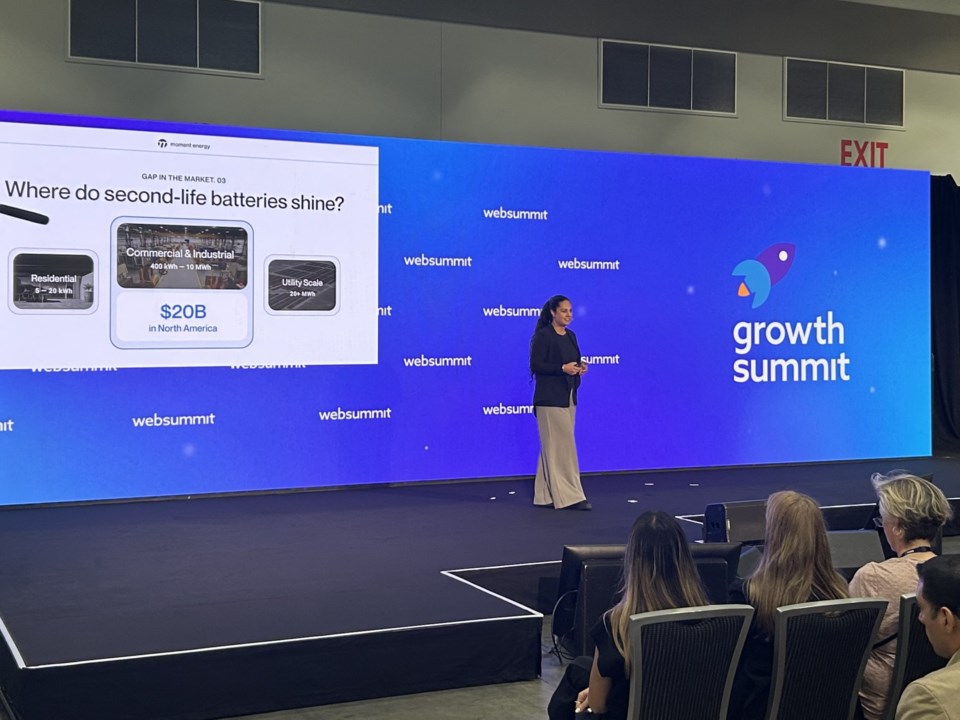As the co-founder of a fast-growing clean tech company that repurposes used electric vehicle batteries, Sumreen Rattan is navigating new hurdles when shipping her product across the border.
The COO of Moment Energy Inc. said her company must now sometimes prove why their power banks are eligible under the Canada-United States-Mexico Agreement, as well as having to be more detailed and mindful of the components of their systems during export.
Coquitlam-based Moment Energy repurposes used electric-vehicle batteries from automakers like Mercedes Benz AG and Nissan North America Inc. by stacking them to make larger-scale power banks. These systems help industries and power utilities smooth out electricity use—storing power when demand is low and supplying it when demand spikes, a process known as demand balancing.
“If our near-term market was majorly in the U.S., it would be extremely challenging,” Rattan told BIV at the global Web Summit in downtown Vancouver May 29. “Since that's more of our long-term market, it hasn't had as big of an impact as we know it has had on other companies.”
When it comes to importing batteries, Moment Energy hasn’t faced challenges yet, she said.
The cleantech firm announced the close of a $22 million Series A funding round led by Amazon.com Inc. (Nasdaq:AMZN) and Voyager Ventures this past January. This followed an October 2024 funding announcement of $28 million from the U.S. Department of Energy to establish a giga-factory in Texas to manufacture the energy storage systems.
Moment Energy has raised $75 million to date and employs 50 people.
Rattan, whose company currently manufactures its power banks in its Coquitlam facility, said site selection is currently ongoing in Texas with a target to complete the first phase of construction by the end of 2026. The facility is expected to scale over the following three years to reach its full production capacity—enough to manufacture energy systems with a combined output of one gigawatt hour, or enough energy to power tens of thousands of homes for an hour.
“In terms of where our growth is progressing to right now, it's definitely setting up that expansion in the U.S.,” she said. “It's a key phase for us.”
There were approximately 40 million electric cars on the road globally as of last year, according to an International Energy Agency 2024 EV outlook. And between 2021 and 2030, 12.85 million tonnes of EV lithium-ion batteries are estimated to go offline, according to a 2020 Green Peace report.
At a time when some B.C. companies might be aiming to diversify, Rattan said plans to expand, scale and meet the needs of the U.S. market still stand, while also recognizing the importance of manufacturing and developing storage systems in Canada.
“Beyond that, we are looking globally as well,” she said.
Moment Energy announced in February 2024 an $800,000 contract with the Vancouver International Airport to provide a battery energy-storage system for high-speed charging capacity for public and YVR vehicles. The B.C. government’s Integrated Marketplace program is providing $386,500 of the funding.
The battery system will be a level-three fast charger with capacity for two EVs at once.
Moment Energy’s Luna battery energy storage system is in the final stages of development and will be deployed to YVR this summer, said Rattan. This power bank is the first of its kind and will be the same system that the company will be deploying over the next year and a half, she said.
Moment Energy works with more than 20 different battery suppliers and brings batteries from wherever they end up being available, including Europe and North America, said Rattan.
At the moment, however, one of the biggest challenges in the sector is the high transportation cost for EV batteries, as well having the proper collection sites in place and the facilities to take in as many batteries as possible, said Rattan.
Ultimately, one of Moment Energy’s long-term goals is being able to repurpose locally, and have a repurposing giga-factory in every region with massive EV adoption, she said.
—With files from Nelson Bennett and Janis Cleugh



